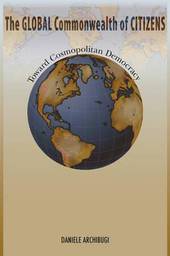
|
The Global Commonwealth of Citizens: Toward Cosmopolitan Democracy
Paperback / softback
Main Details
| Title |
The Global Commonwealth of Citizens: Toward Cosmopolitan Democracy
|
| Authors and Contributors |
By (author) Daniele Archibugi
|
| Physical Properties |
| Format:Paperback / softback | | Pages:320 | | Dimensions(mm): Height 235,Width 152 |
|
| ISBN/Barcode |
9780691166537
|
| Classifications | Dewey:321.8 |
|---|
| Audience | | Tertiary Education (US: College) | | Professional & Vocational | |
|---|
|
Publishing Details |
| Publisher |
Princeton University Press
|
| Imprint |
Princeton University Press
|
| Publication Date |
23 June 2015 |
| Publication Country |
United States
|
Description
The Global Commonwealth of Citizens critically examines the prospects for cosmopolitan democracy as a viable and humane response to the challenges of globalization. Arising after the collapse of the Soviet Union and the decisive affirmation of Western-style democracy, cosmopolitan democracy envisions a world politics in which democratic participati
Author Biography
Daniele Archibugi is professor of innovation, governance, and public policy at the University of London, Birkbeck College, and a research director at the Italian National Research Council in Rome. His books include Debating Cosmopolitics and The Globalizing Learning Economy.
Reviews"Archibugi has been a leading proponent of new forms of cosmopolitan political community in which citizens have opportunities to participate directly in making global choices. In this book, he provides a grand summation of a decade of thinking about cosmopolitan democracy... Archibugi's claim that democracy must be reinvented for a global era leads to extended discussions of the ways in which transnational democracy might operate. It is easy for such discussions to become abstract statements of political dreams, but Archibugi, to his credit, rolls up his sleeves and grapples with the specific ways in which citizen groups can get directly involved."--Foreign Affairs "In applying cosmopolitan logic to concrete issues such as humanitarian intervention, institutional reform at the UN, and democratic transitions, Archibugi has provided an indispensable contribution."--Choice "This work is a much awaited book length exposition of the project of global democracy from one of its leading proponents and represents the culmination of two decades of reflection on this topic. This shows in the richness, thoughtfulness and depth of the arguments the author puts forward in his contribution to a debate that is fundamental for contemporary politics."--Tiziana Torresi, Global Justice Network "Archibugi offers a morally appealing vision of cosmopolitan democracy, and thus anyone who has yet to give up on modernity's humanitarian impulses should read this book."--William E. Scheuerman, Perspectives on Politics "Archibugi outlines his cosmopolitan project in a simple and readable style. Anyone interested in problems of global governance will find the book stimulating and instructive."--Faruk Yalvac, Spectrum "His erudition and command of the salient literature are evident throughout this work, and he moves with ease through a range of debates about suprastate accountability, while engaging convincingly with numerous possible critiques of cosmopolitan democracy... The Global Commonwealth of Citizens provides not only an exhaustive treatment of the benefits and drawbacks of cosmopolitan democracy but the most detailed statement to date of how some form of cosmopolitandemocracy could be realized."--Luis Cabrera, Ethics & International Affairs "This engaging book ... deserves to be read by all who are interested in international institutions and democracy."--Kristian Skrede Gleditsch, Journal of Peace Research "Archibugi's book ... should be applauded and paid attention to."--Jack Crittenden, Journal of Politics "[I]nnovative, thorough and brilliant book."--Stefan Hojelid, European Legacy "The torch has passed from Kant to Archibugi, and if political theorists had a team of optimists, Archibugi would be one of the captains. But I do not think that that optimism, utopian or otherwise, is anything that needs to be excused or explained away. It should be applauded and paid attention to, as should Archibugi's book."--Jack Crittenden, Journal of Politics
|